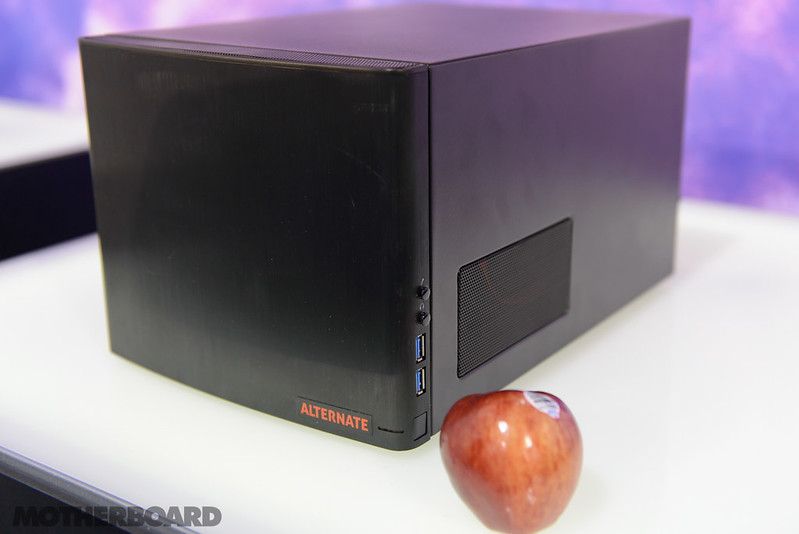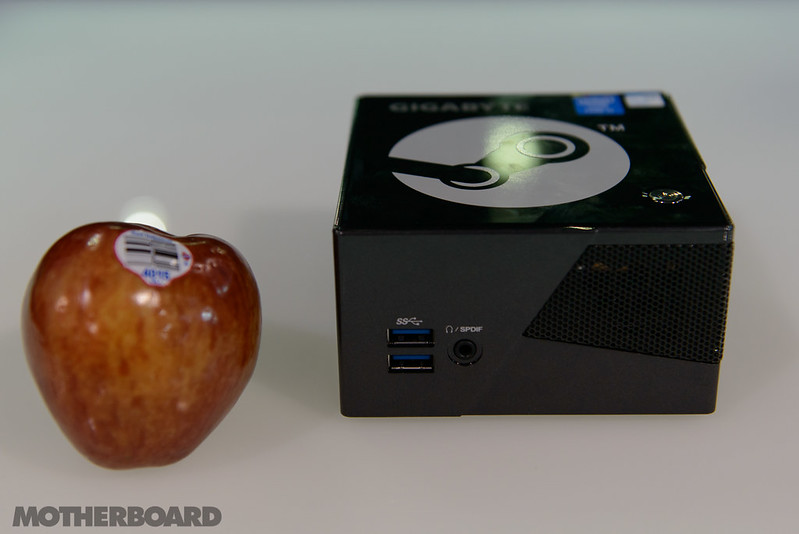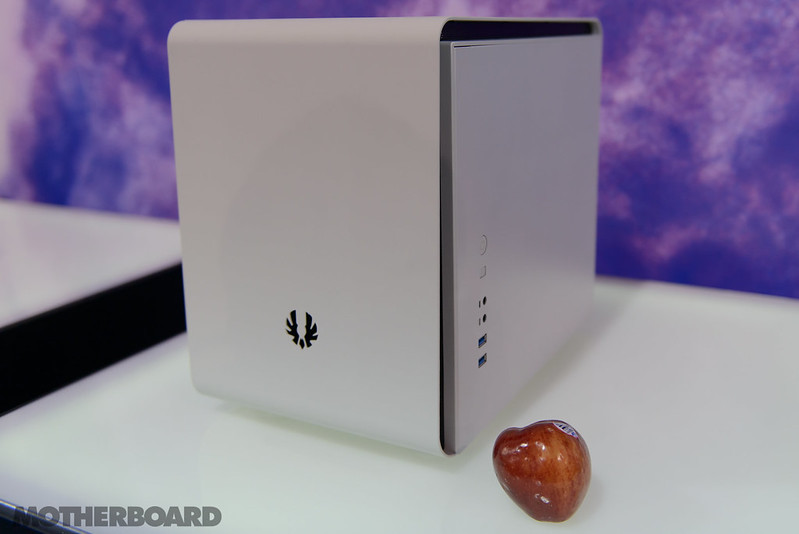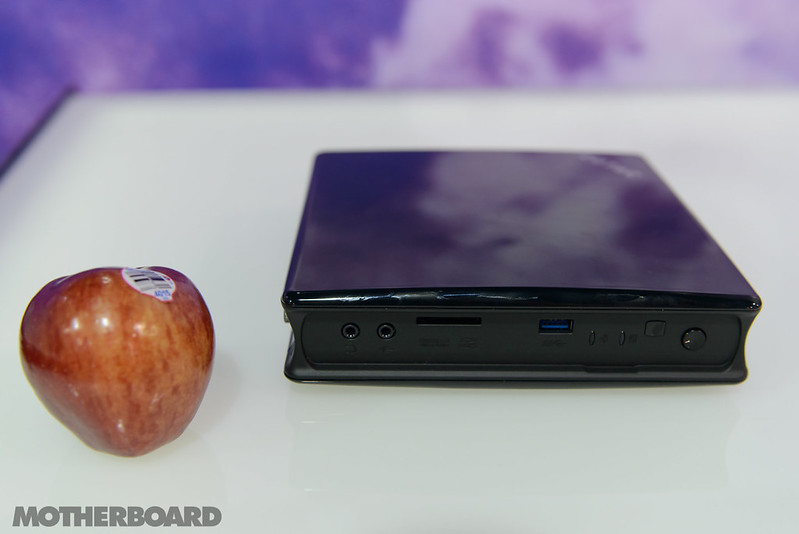Alienware's Steam Machine prototype with apple for size (didn't have a banana, sorry).
Confession No. 1: I currently only own a Nintendo 64 and an SNES. Confession No. 2: When it comes to events like CES, I tend to gravitate towards cameras and cars, figuring I can read about new consoles some other time. And yet at this year's conference, I couldn't wait to see the new Steam Machines in Valve's booth.Why? Like any sugar-addled American boy, my youth was filled with obsessive gaming. I ditched my mom in the grocery store to go read Tips and Tricks as quickly as possible; I had my own Nintendo 64 Kid moment upon laying eyes on the Playstation combo box from Costco that I'd dreamt of for months. (Thanks, Mom.)But as an adult, after the hazy college days of playing Call of Duty on a rooommate's 360 for hours on end, keeping up with new gaming blockbusters has largely meant reading Kotaku. No joke, my biggest gaming accomplishments of the last four years are beating the first four Myst games, getting mustache goombas after beating Super Mario World 100 percent and, along with my girlfriend, completing Secret of Mana in a six month, on-and-off co-op grind that gives me anxiety to even think about.Alternate's model is at the larger end, which kinda defeats the under-the-TV idea. Listed specs: $1339, Core i5 4570, GTX 760, 16 GB of RAM, 1 TB SSHD
What's this got to do with anything? Well, it's all to say—or admit, rather—that while I do love games, I now realize that, in the gaming pantheon, I'm on the rung just above braindead Farmville obsessives. Dare I say it? Alright, screw it: I've become a filthy casual who likes playing old consoles because I don't have the time or money to keep up with the latest AAA titles.Feel free to ridicule me; my younger gaming self does, too. And yet the whole Steam Machine thing has piqued my interest in a way that the new consoles haven't, and if early reactions are any indicator, I'm far from the only one.All I want—and casual or not, I'm not alone—is to play good games. Because I'd rather sit on a couch than behind a desk when playing (who are we kidding, I live in Brooklyn, I don't even have a desk), that either means playing with a console or building a gaming rig in one of the few HTPC form factors out there.Gigabyte's is tiny. I'd love to rock this in my entertainment center, but the lack of discrete graphics is a gamble. Specs: Price TBD, Core i7-4770R, Intel Iris Pro 5200 graphics, 2x4 GB RAM, 1 TB SATA hard drive
Now there's a third option: Console ease of use (self-contained form factor, Steam OS boots directly to your Steam library, that wacky controller) combined with the vast Steam library. And while it's surely possible to build your own for less money, as /r/BuildAPc suggests, the 12 Steam Machines on display at CES are interesting because they offer a different path for gaming to head down.The PC-versus-console debate has always been entertaining, and yet both camps tend to argue different things. Yes, a bitchin' PC gaming rig will blow the doors off of a console's graphics, and multi-monitor 1440pgaming is straight-up awesome. At the same time, the console experience is just so simple. Graphics aside, kicking back on the couch for distraction-free gaming—no swapping between a game, email, and reddit—is relaxing, which is supposed to be part of the point.Even in my Counter-Strikesaturated days, I preferred the experience on a console. Flipping on my 64 today, it's still surprising how it just starts up, GoldenEye ready to go. In fact, most people used to feel that way. It's a simple adage that companies looking to market new features tend to forget: Most people want to use tech that offers the least-frustrating experience. (Quite a high bar we consumers have set.)Webhallen's offering was another bigster. Specs: $1,499, Core i7 4771, GTX 780, 16 GB RAM, 1 TB SSHD
Advanced graphics and customizability aside, the majority of the games market once was dedicated to the (relatively) seamless console experience. Now, that's changed. PC gaming has taken over the market, and while the new generation of consoles will likely claw some of that back, it seems PC gaming is going to stay on top.Why's that? Largely, it's due to Steam. In 2013, a combined 7.2 million Xbox Ones and Playstation 4s were sold; Tuesday night, Steam peaked at 7.2 million people using the service at the same time.It's not exactly an apples-to-apples comparison, considering that Steam has been around for years. But as the console world increasingly focuses solely on AAA titles, Steam's built itself around a much more diverse ecosystem. With a ridiculous library ready to download at any moment and regular sales, it's obvious why Steam is so popular. (It's fascinating that, in a community as prone to uproar as the gaming world, few complain about Steam's DRM and lack of customer support, which are flashpoints for just about any other firm in the industry.)And yet the barrier to entry remains higher than it is for consoles. I'd like to build my own gnarly PC one of these days, but the grand or more I'd spend there has, in the last few years, been better spent on cameras, travel, and beer. Itching to get into modern gaming again, I nearly bought myself a PS4 for Christmas, until I remembered the $400 initial outlay comes with a $70 commitment every time I want to play something new. All I want to do is play some video games, and there are already so many amazing titles out there I still want to play. Playing whatever shooter is newest isn't really a necessity.Zotac's model seems to be in the sweet spot, but vague spec listings make me wonder if they can stick to the price. Specs: $599, Intel Core and GeForce GTX, both models TBD, with RAM and storage TBD as well.
It's clear that folks building Steam Machines aren't sure exactly what they're supposed to be. They range from tiny, fairly basic machines starting at $499, to ridiculous high-end monsters like Falcon Northwest's mode, which tops out at a whopping $6,000 and is the size of a mini-fridge.Now, for $499, a tiny little Steam Machine isn't going to give anyone PC Master Race status. Yet the interest in them—the crowd around the Valve booth yesterday was huge, even days after the announcement—suggests the performance is a bit beside the point. As it does with all tech, it comes down to the experience and the ecosystem, and dropping $499 to jump into the Steam world—which has a wealth of cheap and indie games to match the usual blockbusters—seems, on face value alone, to be a rather tantalizing option.Until I can really get my filthy paws on some of these things, it's fairly pointless to talk about how they'll perform aside from making educated guesses based on their specs. But again, that's a bit beside the point; same as in the camera world, as long as the tech specs hit an arbitrary threshold of being "good enough," people will instead focus on how easy it is to use a gadget.Wacky Kinect dongles and automatic Facebook gameplay sharing are great, but at the end of the day I'm just trying to fool around with some fun, solid games. And while I'm not sure I'll find the perfect Steam Machine—building my own does sound pretty fun—they'll be a success because, beyond facemelting graphics or the products of a multi-million dollar marketing budget, they offer the promise of what we're here to do: chill out and enjoy playing games.@derektmead


